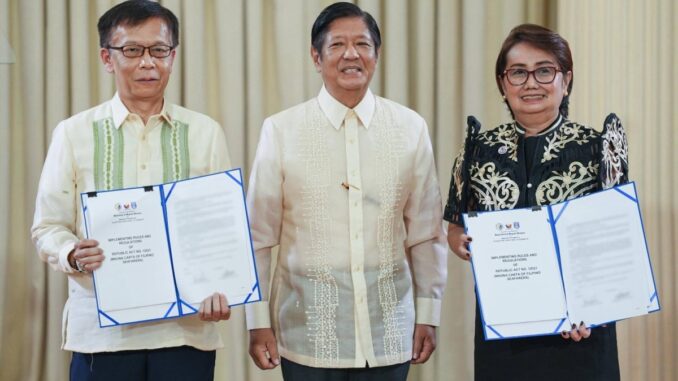
THE Magna Carta of Filipino Seafarers is now ready to be enforced as the Department of Migrant Workers (DMW) and the Maritime Industry Authority (Marina) signed its Implementing Rules and Regulations (IRR) in the presence of President Ferdinand Marcos Jr. on Jan. 8, at the Malacañan Palace.
IRR SIGNED President Ferdinand Marcos Jr. (center) with Migrant Workers Secretary Hans Cacdac (left) and Marina Administrator Sonia Malauan holding signed IRRs of the Magna Cata of Filipino Seafarers. CONTRIBUTED PHOTO
Republic Act 12021, or the Magna Carta of Filipino Seafarers, is an enabling law of the Maritime Labor Convention (MLC) 2006 and the Standards of Training Certification and Watchkeeping (STCW) Convention, thus reinforcing the country’s commitment to international maritime standards.
It establishes comprehensive protection for seafarers at sea and onshore, ensuring they receive fair compensation, adequate training, and access to social and welfare benefits. Key provisions of the law include mandatory shipboard training, fair treatment in the event of illness or injury, and strict regulations to prevent ambulance chasing, among others.
“Ang hakbang na ito ay hindi lamang nagbubukas ng pagkakataon sa industriya; ito rin ay sumasalamin sa atin dedikasyon sa mas progresibo at mas pantay na patakaran sa industriya ng maritime (This step not onlu opens opportunities for the industry; it also reflects our dedication to a progressive and balanced policies in the maritime industry),” Marcos said.
The president said the signed IRR envisions a well-prepared and competitive maritime workforce.
“By enhancing access to advanced training and requiring maritime education institutions to adopt cutting-edge facilities, we are equipping our seafarers and cadets to compete in the global arena. Beyond compliance with international standards, these efforts also secure the future of our seafarers in a rapidly evolving industry,” he added.
“Ito po ay simula lamang ng mas matatag at maliwanag na kinabukasan para sa ating mga marinong Pilipino at sa kanilang mga pamilya (This is only the beginning for a stronger and brighter future for our Filipino seafarers and their families),” Marcos said.
This was echoed by Marina Administrator Sonia Malaluan in her speech, stating that the IRR was a legislative accomplishment and a concrete expression of our country’s gratitude and commitment to seafarers.
“It is high time we establish robust legal safeguards to uphold the rights and address the evolving challenges that they face,” Malaluan said.
The Marina administrator said that the IRR comprises 22 rules that provide a detailed framework to operationalize the provisions of the law.
Key provisions include strengthening seafarers’ rights and welfare, promoting equality and inclusion, and advancing maritime education and training. The IRR resulted from three months of extensive consultations involving government agencies, maritime industry stakeholders, training institutions, nongovernmental organizations, and civil society groups.
Meanwhile, Migrant Workers Secretary Hans Leo Cacdac said in his speech that the signing of the IRR was a historic milestone for the maritime industry. He added that it was a testament to the government’s collective commitment to uplift, protect and empower the lifeblood of global shipping: the seafarers.
“The IRR we signed today embodies the principles of protection, empowerment and collaboration. It is designed to strengthen the rights, welfare and dignity of our fil seafarers who traverse the seas of the world,” Cacdac said. “This reflects months of thorough consultation, rigorous review and sincere dialogue among stakeholders and social partners, ensuring that the provisions serve the interests of our seafarers and their families.”
“For our seafarers, this IRR is for you. It is our covenant to protect your rights and empower your aspirations. It is the promise that your government stands with you every step of your journey. It reflects our collective vision for a maritime workforce that is secure, respected and ready to face the challenges of a dynamic maritime sector,” he added.
The DMW, represented by Secretary Cacdac, led the IRR’s formulation as Chair, with MARINA serving as Vice Chair.
The IRR’s approval paves the way for various government agencies to develop subsequent policies and guidelines to fully effect the Magna Carta’s principles.
Malaluan called for collective action: “We owe this achievement to the dedicated efforts of legislators, agencies, stakeholders, and seafarers who engaged with us during the drafting process. Let us all commit to implementing these rules effectively, keeping seafarers’ welfare at the forefront.”


Be the first to comment